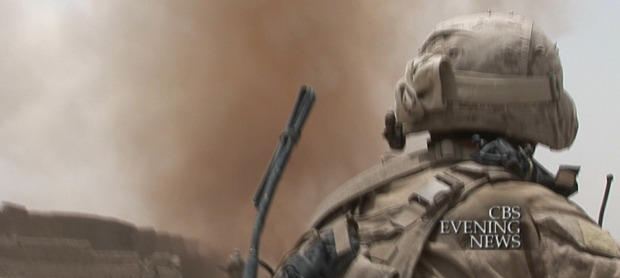The Most Dangerous Job in Afghanistan - Clearing IED's
About three-quarters of all U.S. casualties are caused by IEDs, which also kill and maim large numbers of Afghan civilians. The job is done, primarily, by explosive ordinance disposal (EOD) teams, who are trained to find the bombs, aided by combat engineers, who have the heavy equipment and explosives to clear them away.
This is the story of three such men - Corporal Daniel Greer, with the 4th Combat Engineer Battalion, and Sergeant Johnny Jones and Staff Sergeant Eric Chir, both from the 1st EOD company, attached to the Third Battalion, First Marines - the 3/1. For seven days they worked to find bombs in the Taliban stronghold of Safar Bazaar. Then one blew up unexpectedly.
It was ten minutes before noon when we heard the explosion, just to the south of the compound which the Marines had occupied on the edge of the bazaar. Because of the concentration of IEDs in Safar, the Marines had been ordered to move very slowly, checking every small patch of ground three times with metal detectors, dogs, robots and often on hands and knees with a knife probing under the surface.
Jones and Chir, who worked as a team, and Greer, who worked with the other engineers, had been there since the first day of the offensive - they had lost count of the number of bombs they had found. There were controlled detonations going off two or three times an hour as the engineers or the EOD techs blew up yet another device, rendering it harmless. Everyones' ears were ringing. On this occasion, Greer and Jones and Chir, with several others, were investigating a suspect pile of mortars and tubes at the back of a building barely 50 yards from the compound where the Marines were sleeping.
More of Terry McCarthy's "Thundering Third" Blogs:
In Afghanistan, a Beautiful Desert Goes Boom
A Day in the Life: Wardak, Afghanistan
Because the local residents were scared of all the explosions going off, the Marines had been using loudspeakers to give them a two minute warning before any controlled detonation, telling them where it was and warning them to keep their distance. But when this particular explosion went off, there had been no loudspeaker warning. Still, initially there was hope that it was a controlled explosion that someone had forgotten to radio in. A sniper on an elevated position at the edge of the compound who could see where the blast had happened was the first to realize this was no controlled explosion, and that it had happened where the engineers and EOD team were working.
"Corpsman" he shouted, calling for a medic (who are universally referred to as "corpsmen" in the Marines). Within moments half a dozen Marines with two stretchers ran across the road and down the back of the building to where the blast had happened.
Captain Nathan Opie, Greer's commanding officer, rushed across and was met by another one of his men who said "they got Greer sir, and they got him pretty bad." Greer was lying on the ground, with a head injury. Near him lay Jones, who had lost both his legs. Chir had taken a lot of shrapnel, but was still able to walk. The three men were brought back to a mobile trauma bay that had been set up in the Marines' compound, where Lieutenant Commander Lanny Littlejohn, a trauma doctor, worked on them until the medevac helicopters arrived - less than 30 minutes after the blast.
A Preview Video of this Story is Embedded Below
When the battalion commander, Lieutenant Colonel Ben Watson, walked into the trauma bay to talk to the men, Jones could only say to him "Sorry I let you down, sir." Watson was speechless. The three men were taken away by helicopter.
The Marines who were left behind were devastated. All knew the tremendous risks these men had taken - repeatedly - over the preceding seven days as they worked to clear the bazaar of bombs. The night before the explosion, Randall Joyce, the CBS producer on site, had casually asked Jones why he did the job he did. "I don't get off on killing people, I'd rather be saving lives," Jones replied.
Some days later we learned that Corporal Greer had died of his injuries. It was a further blow to the Marines, particularly to the Combat Engineers, who had already had 13 men wounded during their deployment. Greer, married with a two-year old son, was a reservist who was a firefighter - he came from Nashville Tennessee, the same town as his commanding officer, Capt Opie. Their wives had socialized together, and Opie, who has a son of the same age, had been talking to him about his family just the day before the explosion. Now he was struggling to come to terms with the loss, and keep the other engineers focused on their mission.
"We can't just take some time off and grieve," said Opie. "We have got to press forward until it is our turn to go home and when we reach that point we will deal with this, and we will figure out how to live with it then. But for now we just have to press forward, and that is what we will do."
That is what Marines do.
